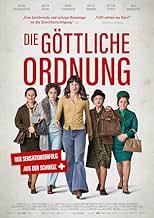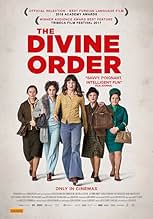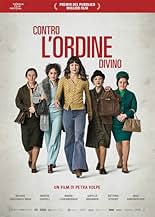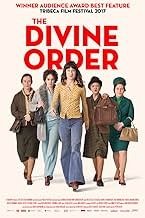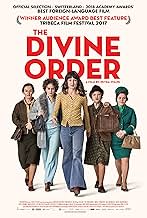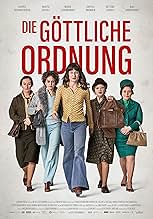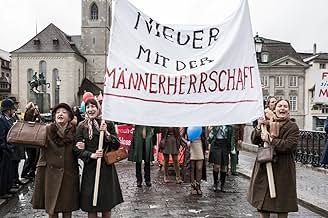NOTE IMDb
7,1/10
3,2 k
MA NOTE
En 1971, une jeune femme au foyer organise les femmes de sa ville pour qu'elles se mobilisent pour le droit de vote.En 1971, une jeune femme au foyer organise les femmes de sa ville pour qu'elles se mobilisent pour le droit de vote.En 1971, une jeune femme au foyer organise les femmes de sa ville pour qu'elles se mobilisent pour le droit de vote.
- Réalisation
- Scénario
- Casting principal
- Récompenses
- 14 victoires et 11 nominations au total
Maximilian Simonischek
- Hans
- (as Max Simonischek)
Avis à la une
Year 1689 and a small province of today's Netherlands allowed women farmers to vote in local elections that then followed by Sweden, NJ in USA, New Zealand and many more ...even British india allowed women to vote in early 20th century... but it took years for this neutral, the richest country in the world to recognize women not as just maids, mothers and inferior to men.. although it feels more of a surface level but an insightful account of swiss women suffrage movement in 1971 ..countries like india already had a woman prime minister then...
Wish more movies like this can be made.
The Divine Order had a great script, just the right amount of light comedy, good acting and great direction.
The subject matter itself was insightful. Although to my knowledge it's not based on actual personas, it's still relatively based on historical facts. The right for women to vote.
Funny enough many of the unfortunate scenarios focusing on a woman's place in the home or society can still ring true today.
I just wish movies like this can be better advertised. The only reason I came across this film is by researching for the best films on Kanopy. It's make you wonder how many good films out there go unnoticed.
The Divine Order had a great script, just the right amount of light comedy, good acting and great direction.
The subject matter itself was insightful. Although to my knowledge it's not based on actual personas, it's still relatively based on historical facts. The right for women to vote.
Funny enough many of the unfortunate scenarios focusing on a woman's place in the home or society can still ring true today.
I just wish movies like this can be better advertised. The only reason I came across this film is by researching for the best films on Kanopy. It's make you wonder how many good films out there go unnoticed.
I assume that the characters in "The Divine Order" were not based on real people, as the filmmakers surely would have indicated this was the case. However, it doesn't matter too much, as the story is based on women's push for suffrage in Switzerland...the last of the industrialized nations to grant this freedom.
The film is set in a small town in Switzerland in 1971. Women's rights are pretty much unknown to this part of the world and folks just seem to accept that it's God's plan for men to be in charge. However, slowly two women manage to convince the rest of the ladies in town that their cause is just...but they really need to convince the men since they are the ones who need to vote in favor of this.
While this story could have come off as angry or anti-male, it's really not...but more about just giving the women an even break. It also accentuates how beneficial this could be for the men...without being preachy. Well worth seeing and very well written, acted and directed.
The film is set in a small town in Switzerland in 1971. Women's rights are pretty much unknown to this part of the world and folks just seem to accept that it's God's plan for men to be in charge. However, slowly two women manage to convince the rest of the ladies in town that their cause is just...but they really need to convince the men since they are the ones who need to vote in favor of this.
While this story could have come off as angry or anti-male, it's really not...but more about just giving the women an even break. It also accentuates how beneficial this could be for the men...without being preachy. Well worth seeing and very well written, acted and directed.
The Swiss film Die göttliche Ordnung was shown in the U.S. with the translated title, The Divine Order (2017). The movie was written and directed by Petra Biondina Volpe. The film stars Marie Leuenberger as Nora, a wife and mother living in a small Swiss rural city.
Nora would like to work outside the home, but for this she needs her husband's permission. Starting with this revelation, we quickly learn that the society is incredibly patriarchal. The key point is that women can't vote. So, they can't change the rules that keep them down because they don't have the political authority to bring about change.
This change only came about because of women's work outside the system, using every tactic they could think of to get the system changed. (It did change, as we know. What I didn't know is that the last voting restriction against women didn't fall until 1991!)
In a movie like this, the quality rises or falls based on the work of the protagonist. Leuenberger is a experienced professional actor. She was superb in this role, and that isn't only my opinion. She won the best actress award in an international feature at the Tribeca Film Festival in NYC for her work in The Divine Order.
This isn't a perfect film. There are some obviously contrived situations, and some very predictable scenes.
It sounds strange, but the movie was sometimes difficult to watch. Switzerland in 1971 was so bizarrely out of synch with the rest of the developed world that the setting felt like a medieval kingdom rather than a rich, modern, industrialized nation. I kept waiting for William Tell to walk down the street with his crossbow.
I had to keep reminding myself, "This really happened. Swiss women truly couldn't vote. Many men--and some women--wanted to keep it that way."
We saw this interesting movie at Rochester's excellent Little Theatre. It was shown as part of the 2017 High Falls Film Festival--Celebrating Women in Film. It will work well on a small screen.
Nora would like to work outside the home, but for this she needs her husband's permission. Starting with this revelation, we quickly learn that the society is incredibly patriarchal. The key point is that women can't vote. So, they can't change the rules that keep them down because they don't have the political authority to bring about change.
This change only came about because of women's work outside the system, using every tactic they could think of to get the system changed. (It did change, as we know. What I didn't know is that the last voting restriction against women didn't fall until 1991!)
In a movie like this, the quality rises or falls based on the work of the protagonist. Leuenberger is a experienced professional actor. She was superb in this role, and that isn't only my opinion. She won the best actress award in an international feature at the Tribeca Film Festival in NYC for her work in The Divine Order.
This isn't a perfect film. There are some obviously contrived situations, and some very predictable scenes.
It sounds strange, but the movie was sometimes difficult to watch. Switzerland in 1971 was so bizarrely out of synch with the rest of the developed world that the setting felt like a medieval kingdom rather than a rich, modern, industrialized nation. I kept waiting for William Tell to walk down the street with his crossbow.
I had to keep reminding myself, "This really happened. Swiss women truly couldn't vote. Many men--and some women--wanted to keep it that way."
We saw this interesting movie at Rochester's excellent Little Theatre. It was shown as part of the 2017 High Falls Film Festival--Celebrating Women in Film. It will work well on a small screen.
I just came from seeing this movie at the Tribeca Film Festival. What a treat. I wanted to see it because it seemed incredible that the Swiss did not grant women the right to vote until the 1970's. How could such a country be so backward on women/human rights. Women were not allowed to vote, open their own bank accounts, or take a job without the permission of their husbands. Amazing! The acting was so natural and the cause so relevant today when women's rights are still under attack. One of the best movies with a message that I have seen in a long time. Brought back many memories I had of the women's movement in the U.S. in the 70's. Wonderful talk back after the movie with the director and some of the actresses.
Le saviez-vous
- AnecdotesSwitzerland's submission to the Foreign Language Film Award of the 90th Annual Academy Awards.
- Bandes originalesYou Don't Own Me
Written by John Madara (uncredited) and Dave White (uncredited)
Performed by Lesley Gore
Meilleurs choix
Connectez-vous pour évaluer et suivre la liste de favoris afin de recevoir des recommandations personnalisées
- How long is The Divine Order?Alimenté par Alexa
Détails
- Date de sortie
- Pays d’origine
- Sites officiels
- Langues
- Aussi connu sous le nom de
- The Divine Order
- Lieux de tournage
- Sociétés de production
- Voir plus de crédits d'entreprise sur IMDbPro
Box-office
- Montant brut aux États-Unis et au Canada
- 76 277 $US
- Montant brut mondial
- 195 081 $US
- Durée
- 1h 36min(96 min)
- Couleur
- Rapport de forme
- 2.35 : 1
Contribuer à cette page
Suggérer une modification ou ajouter du contenu manquant



